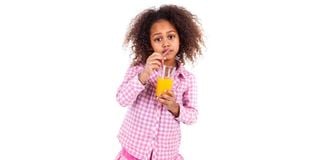Kenyan babies being fed unhealthy foods - report

A new report by the Kenya Demographic Health Survey shows that young children are being fed unhealthy foods.
About half of Kenyan toddlers are fed sweet beverages and another 26 per cent are given unhealthy food, actions that experts say will lead to poor health outcomes.
The latest data from the Kenya Demographic Health Survey (KDHS) reveals the practices of Kenyan mothers that negatively affect their children’s health.
The report describes unhealthy foods as those that have high sugar, salt and unhealthy fats.
For infants aged below six months, who should be exclusively breastfed, the data shows that this only happens for six in every 10 infants.
Compared to the KDHS survey in 2014, the percentage of children who exclusively breastfeed has dropped by 1 per cent.
A combination of laxity in exclusive breastfeeding, and feeding children unwholesome foods and beverages is a ticking time bomb. This is even as the data shows that only 31 per cent of Kenyan children get a balanced diet.
Grace Muteti, a paediatric nutritionist, told the Nation yesterday that there is a sense of disregard for a nutritionist’s expertise when it comes to children’s feeding habits in the country. A trend that she attributes to poverty and ignorance.
“I mostly work with the Swahili community and even when my colleagues and I offer nutrition education, some mothers choose not to exclusively breastfeed their children. They prefer giving their children local delicacies such as viazi karai or cooked bananas yet there are better alternatives that have better health outcomes,” she said.
Poor feeding habits
Explaining the danger that sweetened beverages pose to children, Ms Muteti said that the earlier a mother introduces a child to sweetened food, the likelier the child will have poor feeding habits.
“When a child is used to sweet food and drinks such as soda, tea or porridge with too much sugar, introducing different types of food, especially the healthy ones, is often chaotic. Most women will complain that their child does like eating but the root cause is that they are introduced to unhealthy foods that may not be available at all times,” she said.
The ripple effect of poor feeding habits is malnutrition, which the nutritionist says has become rampant. She advises parents to consider feeding their children a variety of food nutrients such as proteins, carbohydrates and vitamins.
Studies show that when a child is exposed to sweetened beverages, a string of health complications await them.
One study published by the scientific journal BMC Obesity shows that intake of sweetened beverages in children increases the risk of obesity and dental caries, some may even have worse complications that could result in diabetes.
Explaining why such foods lead to an overweight or obese child, a study published in the journal Annals of Nutrition Metabolism shows that consuming such foods makes children yearn for more and so they end up taking more than is enough for their bodies.
“Dietary patterns, such as the consumption of sugar-sweetened beverages, may contribute to the development of overweight and obesity through their high energy density, frequency of consumption and large portions. In addition, the calories provided by free sugars, especially in the form of drinks, may not give a sense of satiety and may not reduce the intake of food after their intake,” said the study.
According to the study, other health complications from consuming sugar-sweetened beverages, include short sleep duration, hyperactivity and increased blood pressure.
“Breast milk or infant formula, and water are the only drinks that should be offered before 6 months, and should be the main drinks up to 12 months of age,” explained the researchers.




